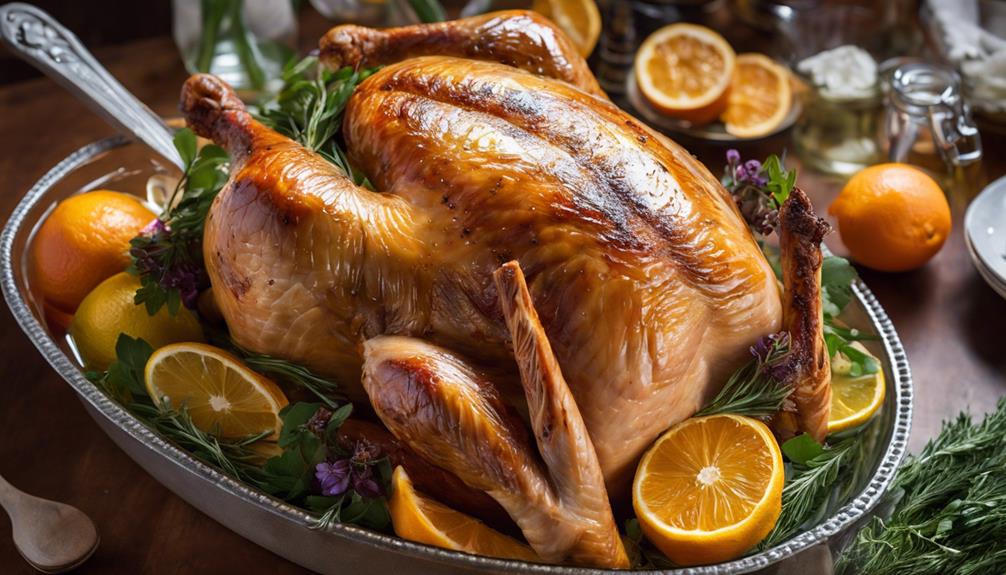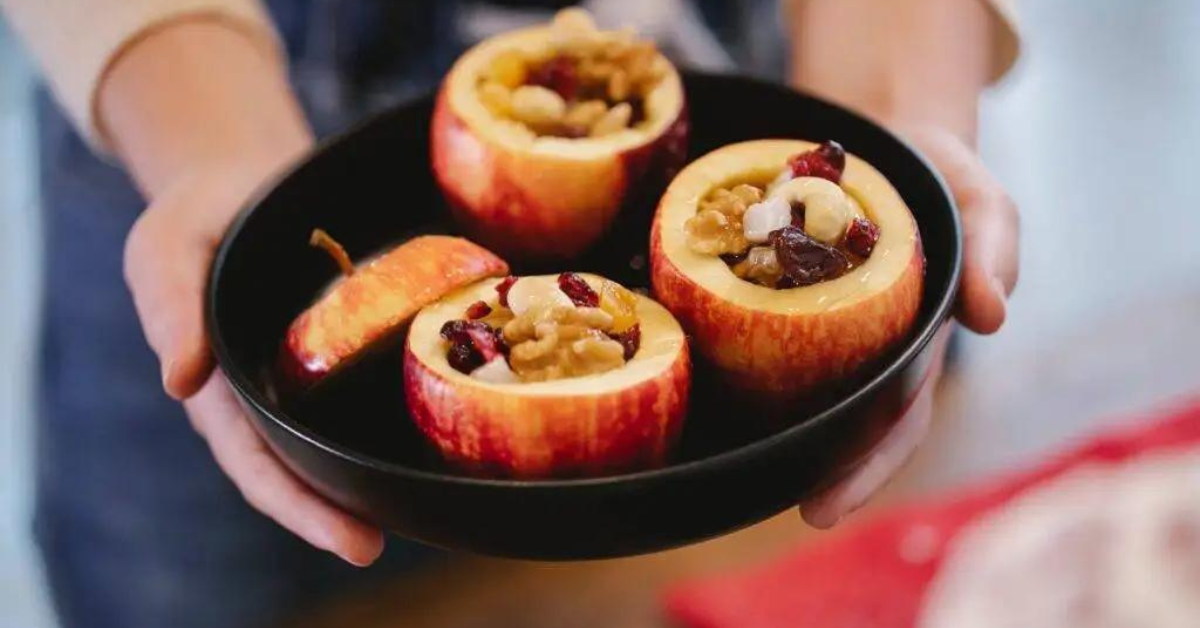Amazing Marinating Techniques For Juicy Turkey

Marinating Techniques For Juicy Turkey; To achieve a juicy turkey, start by selecting the right marinade, balancing acidity, sweetness, and seasoning. Citrus-based, herb-infused, or even simple brines work wonders. Marinate for the proper duration; longer for non-acidic options and shorter for acidic ones. Make sure you use a non-reactive container and always refrigerate your turkey to prevent bacteria. Massage the marinade evenly over the bird for maximum flavor absorption. Consider enhancing flavor by injecting the marinade directly into the meat. With the right techniques, your turkey will not only be moist but also bursting with flavor. There’s plenty more to explore on perfecting your marination!
Importance of Marinating Turkey
Marinating turkey is often overlooked, but it plays an essential role in enhancing flavor and tenderness. When you marinate your turkey, you’re allowing the seasoning and ingredients to seep into the meat, which leads to improved flavor penetration. This process transforms an otherwise bland turkey into a juicy and flavorful dish that everyone will enjoy.
Understanding marinade safety is vital when preparing your turkey. Always use a non-reactive container, like glass or stainless steel, to prevent any chemical reactions with acidic ingredients. Make sure to keep your turkey in the fridge while marinating; room temperature can promote bacterial growth, putting your meal at risk. Ideally, marinate your turkey for at least a few hours, but overnight is best for maximum flavor absorption.
The right marinade can make all the difference. It not only adds taste but also helps break down the proteins in the meat, which contributes to tenderness. As you experiment with different ingredients, you’ll discover how they interact with the turkey, creating unique and delightful flavors. While marinating, don’t forget to reserve some of the marinade to baste the turkey during cooking, ensuring that those flavors stay locked in.
Choosing the Right Marinade
When it comes to enhancing the flavor of your turkey, selecting the right marinade is vital. The marinade you choose can make all the difference in creating a juicy and flavorful bird. Start by considering the flavor profiles you want to achieve. Do you prefer something tangy and citrusy, or are you leaning towards a savory herb blend? Knowing your desired outcome will guide your decision-making process.
Experimenting with different marinade combinations can lead to wonderful discoveries. For instance, combining soy sauce with ginger and garlic creates a delicious Asian-inspired flavor, while a mixture of olive oil, lemon juice, and rosemary offers a classic Mediterranean touch. If you’re feeling adventurous, you might try a sweet and spicy marinade using honey, sriracha, and apple cider vinegar. Each combination brings out unique qualities in the turkey, so don’t hesitate to get creative.
Consider the balance of flavors in your chosen marinade. It’s essential to have a mix of acidity, sweetness, and seasoning to properly penetrate the turkey meat. Acids help tenderize, while sweet elements can caramelize during cooking, enhancing the overall taste.
Additionally, think about the cooking method you’ll use. Grilling might benefit from a bolder, more robust marinade, whereas roasting could be complemented by a subtler blend. Ultimately, the right marinade will not only elevate your turkey’s flavor but also guarantee it turns out juicy and delicious. So take your time, experiment, and enjoy the process!
Popular Marinade Ingredients
When it comes to turkey marinades, citrus-based options and herb and spice blends are fan favorites. Citrus adds a bright, invigorating flavor that can really enhance your turkey, while a mix of herbs and spices brings depth and warmth. Let’s explore how these ingredients can transform your turkey into a delicious masterpiece.
Citrus-Based Marinades
Citrus-based marinades are a fantastic way to infuse turkey with vibrant flavors and tenderize the meat. When you use ingredients like lemon, lime, or orange juice, you’re not just adding zest; you’re also creating a dynamic interplay of acidity and sweetness that enhances the turkey’s natural taste. The key is to strike a flavor balance, ensuring that the citrus doesn’t overpower the dish but complements it instead.
To make a simple citrus marinade, combine your choice of citrus juice with olive oil, garlic, and a bit of honey or sugar for added sweetness. Don’t forget to incorporate citrus zest, as it packs an extra punch of flavor and aroma. You can also add a pinch of salt and pepper to round out the taste.
Allow the turkey to marinate for at least a few hours, or ideally overnight, to let those flavors penetrate deeply. As the turkey absorbs the zesty notes, you’ll find that it not only tastes incredible but also comes out juicy and tender. So next time you’re preparing turkey, consider a citrus-based marinade for a revitalizing twist.
Herb and Spice Blends
While citrus marinades offer a revitalizing burst of flavor, herb and spice blends can elevate your turkey to new heights with their rich, aromatic profiles. When crafting your marinade, think about the herb combinations that best suit your taste. Classic choices include rosemary, thyme, and sage, which pair beautifully together, creating a savory base that brings out the turkey’s natural flavors.
For a more adventurous twist, consider adding herbs like tarragon or dill. These can introduce unique notes that surprise and delight your palate. Don’t forget about the spice ratios—balancing herbs with spices like garlic powder, paprika, or black pepper is essential. A general rule of thumb is to use two parts herbs to one part spices, but feel free to adjust according to your preference.
After mixing your herb and spice blend with oil or broth, let your turkey soak in the marinade for at least a few hours, or preferably overnight. This allows the flavors to penetrate the meat deeply, resulting in a juicy and flavorful turkey that will impress your guests. Embrace the rich world of herbs and spices; your taste buds will thank you!
Dry Vs. Wet Marinades
Often, cooks debate the merits of dry versus wet marinades for turkey, each offering unique benefits. Dry marinades, typically made from a blend of spices and herbs, work by forming a flavorful crust on the turkey’s surface. This can help seal in moisture during cooking, giving you a juicy result with a nice texture. Plus, they’re super easy to prepare—just rub the mixture onto the turkey and let it sit for a while. You won’t have to worry about excess liquid, and they can be an excellent choice for those who prefer a stronger, concentrated flavor.
On the other hand, wet marinades, which include liquids like soy sauce, vinegar, or citrus juice, penetrate the meat more deeply. These marinades not only add flavor but also help tenderize the turkey by breaking down proteins. The downside is that they can sometimes make the turkey a bit too wet, which might prevent that desirable crispy skin. However, if you’re aiming for a more succulent and flavorful bird, a wet marinade might be just what you need.
Ultimately, your choice between dry and wet marinades depends on the flavor profile you’re looking for and the cooking method you plan to use. Experimenting with both can lead to delicious discoveries, so don’t hesitate to try each technique to find what works best for your turkey.
Marinating Time Guidelines
When it comes to marinating turkey, timing is essential for achieving the best flavor. You’ll want to take into account how long to marinate based on the type of marinade you’re using and the temperature at which you’re marinating. Understanding ideal durations can elevate your turkey from good to great, so let’s break it down.
Optimal Marinating Durations
Getting the marinating duration just right is essential for infusing your turkey with flavor without compromising its texture. Depending on the marinating methods you choose, the ideal time can vary greatly. For a simple brine, aim for at least 12 hours, but no more than 24 hours. This timeframe allows for adequate flavor absorption while preventing the meat from becoming too salty or mushy.
If you’re using a marinade with acidic ingredients like vinegar or citrus, keep the marinating time shorter—about 4 to 6 hours. The acidity can break down the meat’s proteins too much if left too long, resulting in an unappetizing texture. For marinades that are less acidic, such as those based on yogurt or oil, you can extend the duration to 8 to 12 hours.
Always remember to marinate your turkey in the refrigerator to maintain food safety. After you’ve marinated your turkey for the right amount of time, be sure to pat it dry before cooking to achieve that perfect golden-brown skin. With these guidelines, you’re well on your way to a delicious and juicy turkey!
Temperature Impact on Flavor
The temperature at which you marinate your turkey can greatly influence the flavor absorption. When you marinate at room temperature, the meat absorbs flavors more quickly due to increased enzyme activity. However, be cautious—keeping your turkey out for too long can lead to food safety issues. Ideally, marinate in the refrigerator to maintain a safe temperature while still allowing for effective flavor concentration.
Temperature variations can also affect how deep the marinade penetrates the meat. Cooler temperatures slow down the absorption process, meaning you’ll need to extend the marinating time. If you opt for a warm environment, the turkey might soak up flavors faster, but it’s important to limit the time to prevent spoilage.
For best results, you’ll want to balance these factors. A longer marinating period at a cooler temperature can yield juicy, flavorful turkey without compromising safety. So, keep in mind that while temperature plays a pivotal role in flavor absorption, ensuring food safety should always come first. Aim for a cool environment and the right marinating duration to achieve the most flavorful turkey possible.
Marinade Types and Timing
Choosing the right marinade type and timing is vital for maximizing flavor in your turkey. You’ve got several options when it comes to marinades, each offering unique flavor profiles. For a tangy kick, consider citrus-based marinades, which pair well with herbs like rosemary and thyme. If you’re leaning toward something richer, a soy sauce or balsamic vinegar blend can create a savory depth.
When it comes to marinade ratios, aim for a balance of acid, oil, and seasonings. A general rule of thumb is to use one part acid to three parts oil, adjusting to taste. This ratio helps tenderize the meat while infusing it with flavor.
Timing is important, too. For whole turkeys, marinate for at least 12 hours and up to 24 hours to allow those flavors to penetrate effectively. For turkey breasts or smaller cuts, 4 to 6 hours usually suffices. Avoid marinating for too long, especially with acidic marinades, as they can break down the meat’s texture. Follow these guidelines, and you’ll guarantee your turkey is juicy and bursting with flavor!
Techniques for Even Coating
To guarantee your turkey is evenly coated in marinade, start by breaking down the process into manageable steps. First, choose a marinade that complements your turkey and properly balances flavors. Once you’ve made your marinade, it’s essential to prepare your turkey. Rinse and pat it dry with paper towels; this helps the marinade adhere better.
Next, you’ll want to focus on the marinade application. Use a large resealable plastic bag or a shallow dish to hold your turkey. Pour the marinade over the turkey, making sure it’s fully submerged. If you’re using a bag, seal it tightly and massage the marinade into the meat to promote even distribution. This step is fundamental as it allows the flavors to penetrate deeper into the turkey.
If you’re marinating a whole turkey, consider rotating or flipping it halfway through the marinating process. This guarantees that all parts of the bird receive equal exposure to the marinade. For smaller cuts like turkey breasts or thighs, you can also use a brush to apply the marinade directly onto the surface, making sure to cover every inch.
Enhancing Flavor With Injection
Often, injecting marinade directly into the turkey can greatly enhance its flavor and juiciness. This technique, known as flavor injection, allows the marinade to penetrate deep into the meat, guaranteeing every bite is packed with deliciousness. To get started, you’ll need a marinade syringe, which is specifically designed for this purpose.
First, prepare your marinade, keeping in mind that it should be flavorful and well-balanced. Consider using a mixture of herbs, spices, and fats—like butter or oil—to create a rich, savory base. Once your marinade is ready, fill the syringe, making sure to avoid any air bubbles that could interfere with the injection process.
When it comes to injecting, choose several key areas on the turkey, such as the breast and thighs. Insert the needle of the marinade syringe into the meat at a 45-degree angle, and slowly press the plunger to release the marinade. It’s best to inject small amounts at multiple points to guarantee even distribution. Remember to pull the needle out slowly to prevent marinade leakage.
After injecting, let the turkey rest for at least 30 minutes to allow the flavors to meld. This simple yet effective method not only elevates your turkey’s taste but also helps retain moisture during cooking. So grab that marinade syringe and start flavor injecting for a turkey that’s both juicy and bursting with flavor.
Cooking Methods After Marinating
After marinating your turkey, you’ve set the stage for a delicious meal, but the cooking method you choose can make all the difference. One popular option is using smoking techniques. When you smoke your turkey, the low and slow cooking process allows the flavors from the marinade to penetrate deeply, infusing the meat with a rich, smoky taste. Aim for a temperature around 225°F to 250°F, and use hardwoods like hickory or apple for added flavor. This method can take several hours but results in incredibly juicy and tender turkey.
Alternatively, you might prefer grilling methods. Grilling can give your turkey a beautiful char while retaining moisture from the marinade. If you’re using a gas grill, preheat it to medium heat and set up for indirect cooking by turning off one side of the burners. Place your turkey on the cooler side, skin-side up, and close the lid. For charcoal grills, pile the coals on one side and cook the turkey on the opposite side. This technique helps prevent flare-ups and drying out the meat.
Whether you choose smoking or grilling, make sure to monitor the internal temperature. You want to reach 165°F in the thickest part of the breast. Rest your turkey for a bit before carving; this allows the juices to redistribute, ensuring every bite is as succulent as possible. Enjoy your perfectly cooked, marinated turkey!
Frequently Asked Questions: Marinating Techniques For Juicy Turkey
Can I Marinate Turkey Breast and Thighs Differently?
Yes, you can marinate turkey breast and thighs differently! Using marinade variations allows you to create distinct flavor profiles, enhancing each cut’s taste. Experiment with different ingredients to achieve the results you desire for both parts.
How Can I Tell if My Marinade Is Too Salty?
To tell if your marinade’s too salty, taste a small amount. If it overwhelms, you’ve got an issue. Balance flavors by adding more acidic ingredients or sweeteners to counteract the salty taste for a better result.
Is It Safe to Reuse Marinade After Marinating Turkey?
It’s not safe to reuse marinade after marinating turkey. Bacteria from the raw meat can contaminate it. If you want to store it, make sure you boil the marinade first to kill any harmful pathogens.
What Temperature Should Turkey Be Marinated At?
You should marinate turkey in the refrigerator at 40°F or lower for ideal safety and flavor. The marinade duration typically ranges from a few hours to overnight, enhancing the turkey’s flavor considerably.
Can I Marinate Turkey in a Plastic Bag?
Absolutely, you can marinate turkey in a plastic bag. Just choose your marinade type, seal it tightly, and let it sit for the recommended marinating duration, ensuring even flavor absorption and moisture retention throughout.
Conclusion
To sum up, marinating your turkey is key to achieving a juicy and flavorful dish. By choosing the right marinade and allowing enough time for it to soak in, you’ll enhance every bite. Whether you opt for a dry rub or a wet marinade, remember to coat your turkey evenly for the best results. Don’t forget to explore injection techniques for added flavor. With these tips, you’ll impress your guests with a succulent turkey that they’ll rave about!








